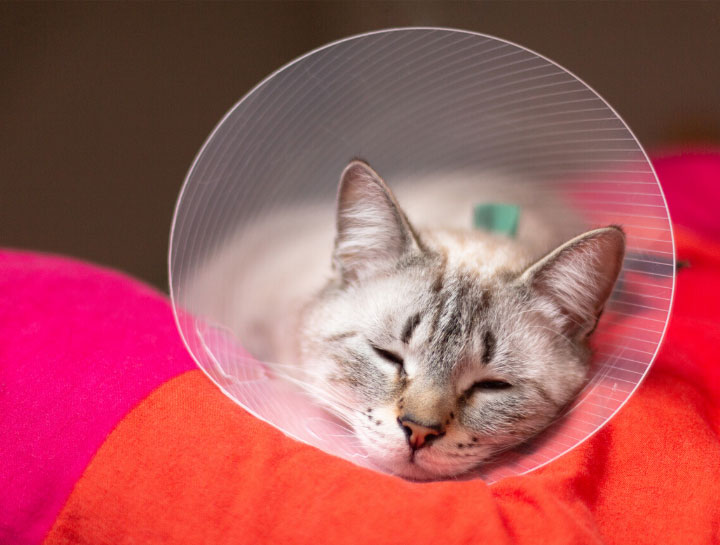Spay & Neuter Procedures
Help your pet live a long, healthy life.
Deciding whether to spay or neuter your cat or dog can be a difficult decision for some pet owners. Although the thought of your pet having surgery may seem scary, we’re here to assure you that spays and neuters are common surgeries that are safe, simple, and generally quick.
When you bring your cat or dog in for neutering or spaying, we make the surgery as safe and comfortable as possible.
Veterinarians and animal clinics across Denver have been neutering and spaying pets for a long time. It’s easy to forget this procedure is major surgery!
At our Castle Rock veterinary clinic, we do everything we can to make sure our neuters and spays are safe and gentle. We treat your cat or dog as an individual. We tailor our care and medications to your pet’s unique needs.
If you visit our veterinary clinic for pet spaying and neutering services, we’ll:
- Make sure you and your pet feel as relaxed as possible. We’ll listen to your questions and share some love with your cherished companion.
- Check your pet’s health up front to make sure there isn’t a basic health issue that could affect the procedure. (Safety first!)
- Provide the best care possible, from tailoring the anesthesia to your pet to monitoring your pet’s vital respiratory functions.
- Offer an optional laser treatment to speed up the healing process.
- Minimize your pet’s discomfort with carefully selected medications.
- Keep our eye on your pet and ensure quiet and rest. We’ll check on your pet multiple times following the procedure, keep your pet in our clinic overnight, and evaluate his or her health the next morning.
How our pet spaying and neutering appointments work
Usually, we’ll ask you to bring your cat or dog in on the morning of the surgery (before your pet has eaten). You can expect to spend about 10 to 15 minutes at our Castle Rock veterinary clinic when you arrive. We’ll ask you questions about your pet’s health and go over some paperwork.
With your permission, we’ll run a blood test to check your pet’s organs. We want to make sure your pet can safely handle the medications we plan to use for the procedure.
The length of surgery depends on your dog or cat
It typically ranges from 45 to 90 minutes. Following the surgery, we’ll check on your pet every 15 minutes or so to ensure your cat or dog is recovering well.
We like to keep your pet overnight after major surgery.
By the time we check your pet’s health the following morning, your furry friend should be getting back to his or her normal self!
FAQs about our spaying and neutering services
Why do you keep my pet overnight?
This is a great question. There are several reasons:
- First, your dog or cat can recover peacefully in a quiet environment.
- Second, we check your pet in the morning to make sure everything is going as planned before your furry friend goes home. If there are any issues, we can address them then, rather than having you come back in for an additional visit.
- And finally, cats and dogs can make some strange noises when the anesthesia wears off. While these noises may sound alarming, they’re normal. It’s just the anesthesia. Staying overnight ensures a quiet environment for your pet. Plus, it can be less stressful for you.
What’s the best way to care for my pet after a spay or neuter? What’s the recovery time?
By the day after the surgery, your dog or cat can go back to a normal eating pattern. Keep in mind, some medications may slow down your pet’s gastrointestinal functioning. This means your pet may be less hungry. Or, your pet’s defecation schedule may be slower than usual for a day or two.
Usually, our veterinarians recommend that you minimize your pet’s activity for at least 7 days — ideally, 10 to 14 days — to protect the incision line.
- Keep your pet from running and jumping, if possible.
- For example, we recommend putting your dog on a leash when he or she needs to go outdoors.
- It also means no bathing or swimming.
Will neutering my dog or cat affect his “vitality?”
Your dog’s or cat’s desire to mate is pheromone driven, rather than from enjoyment. So, neutering your pet should not affect his happiness.
What are the benefits of cat and dog neutering and spaying?
There are so many unwanted dogs and cats, even in Colorado. Spaying or neutering a dog or cat can make such a difference!
Just as important, spaying and neutering offer health benefits for your pet:
- If you have a male dog, neutering reduces his desire to roam (and potentially get injured) and his desire to mark everything. It eliminates his risk of testicular cancer. It also reduces his chances of prostate cancer.
- If you have a female dog, spaying helps her avoid serious uterine infections. It also reduces her risk of certain types of cancers, such as breast cancer.
- If you have a male cat, neutering eliminates his chances of testicular cancer. In addition, it reduces his urge to mark his territory, roam and get into cat fights, where he’s more susceptible to the feline leukemia virus (FELV) and the feline immunodeficiency virus (FIV).
- If you have a female cat, spaying helps her avoid uterine infections and certain types of cancers. It also helps reduce certain behaviors, such as the yelling and crying that can come with a kitty in heat.
What’s the ideal age for spaying and neutering pets?
- Dog neutering: By 6 to 9 months of age
- Dog spaying: By 6 months of age (before your dog’s first heat cycle)
- Cat neutering: By 5 months of age
- Cat spaying: Between 8 weeks and 5 months of age (before your cat’s first heat cycle)
There is some evidence that suggests if you spay or neuter a medium-breed or large-breed dog too early, your dog may be more prone to hip issues. Keep in mind, these types of issues typically can be surgically corrected, whereas cancers can be fatal.
If you’re going to breed your dog or cat, please consider spaying or neutering your pet upon his or her “retirement.” Our veterinarians are happy to discuss your options with you.
If you have questions about getting your pet spayed or neutered, or you’d like to schedule an appointment, give us a call at (303) 688-3757 or request an appointment online.

